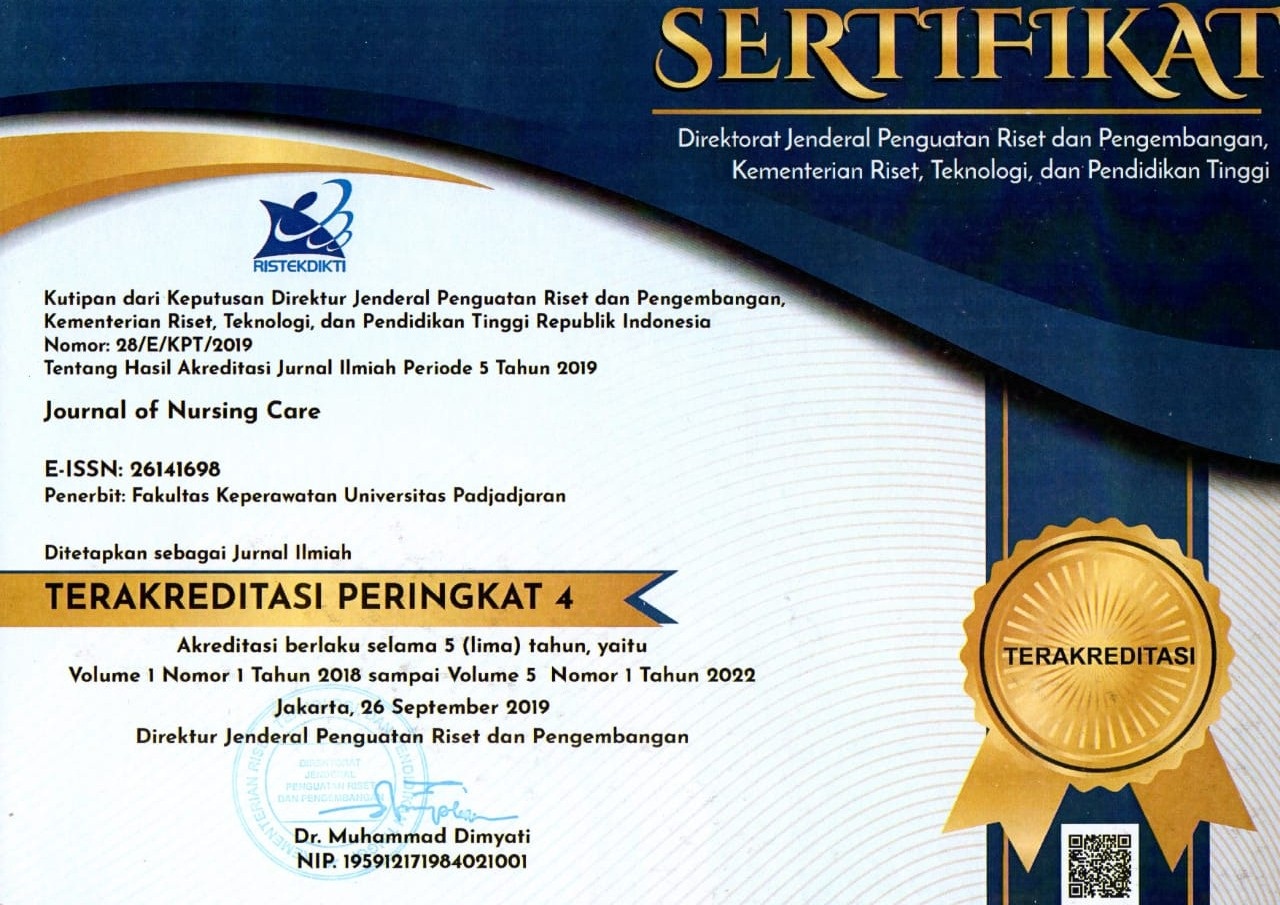Validity and Reliability Study of the Indonesian Student Satisfaction with Cultural Simulation Experiences Scale (SCSES) among Nursing Students
Abstract
Virtual Reality is a technology that can simulate a virtual environment like a real one and make it seem like if users can interact in it. The development of learning to use Virtual Reality has begun to be used as a medium for learning skills to increase students' clinical knowledge and reasoning in nursing practice, so that students can show reasonable learning satisfaction in the learning process. Student satisfaction is needed to determine the effectiveness of using VR in nursing practice. Satisfaction with using virtual reality for student learning experiences can be evaluated using the SCSES (Student Satisfaction with Cultural Simulation Experience Scale), but there is no Indonesian language version for this instrument. This study aimed to translate and adapt the SCSES (Student Satisfaction with Cultural Simulation Experience Scale) instrument in the Indonesia context for nursing students. Methods: The SCSES translation uses the cross-sectional method and in the translation process refers to the five stages of international standard guidelines for translation. Results: The reliability and validity test of the SCSES instrument was tested on 92 Padjadjaran University nursing students. Confirmatory Factor Analysis (CFA) was carried out to measure construct validity. It was found that all items of the Indonesian version of the SCSES instrument were declared valid with the value of all factor loading items > 0.50 and the Cronbach's α test was performed to measure the consistency of measurements (α = 0.964). Conclusions: The Indonesian version of SCSES has good item validity and reliability as a measure of satisfaction in cultural simulation experiences.
.
Keywords
Full Text:
PDFReferences
Chandel, D., & Chauhan, A. (2014). Virtual Reality. International Journal of Science and Research, 13(10), 2319-7064.
Chang, C. L. (2022, August). Effect of Immersive Virtual Reality on Post-Baccalaureate Nursing Students’ In-Dwelling Urinary Catheter Skill and Learning Satisfaction. In Healthcare (Vol. 10, No. 8, p. 1473). MDPI. https://doi.org/10.3390/healthcare10081473
Chang, C. Y., Sung, H. Y., Guo, J. L., Chang, B. Y., & Kuo, F. R. (2022). Effects of spherical video-based virtual reality on nursing students’ learning performance in childbirth education training. Interactive Learning Environments, 30(3), 400-416. https://doi.org/10.1080/10494820.2019.1661854
Chen, F. Q., Leng, Y. F., Ge, J. F., Wang, D. W., Li, C., Chen, B., & Sun, Z. L. (2020). Effectiveness of virtual reality in nursing education: Meta-analysis. Journal of medical Internet research, 22(9), e18290. https://doi.org/10.2196/18290
Cheung, H., Mazerolle, L., Possingham, H. P., Tam, K. P., & Biggs, D. (2020). A methodological guide for translating study instruments in cross‐cultural research: Adapting the ‘connectedness to nature’scale into Chinese. Methods in Ecology and Evolution, 11(11), 1379-1387. https://doi.org/10.1111/2041-210X.13465
Moura, F. T. (2017). Telepresence: The Extraordinary Power of Virtual Reality [internet]. Tersedia pada: https://liveinnovation.org/telepresence-extraordinary-power-virtual-reality/ [Accessed 15 September 2022]
Padilha, J. M., Machado, P. P., Ribeiro, A., Ramos, J., & Costa, P. (2019). Clinical virtual simulation in nursing education: randomized controlled trial. Journal of medical Internet research, 21(3), e11529. https://doi.org/10.2196/11529
Courtney-Pratt, H., Levett-Jones, T., Lapkin, S., Pitt, V., Gilligan, C., Van der Riet, P., ... & Everson, N. (2015). Development and psychometric testing of the satisfaction with cultural simulation experience scale. Nurse education in practice, 15(6), 530-536.http://dx.doi.org/10.1016/j.nepr.2015.07.009
DeVellis, R. F., & Thorpe, C. T. (2011). Scale development: Theory and applications. Sage publications.
Ghozali, I. (2018). Aplikasi analisis multivariate dengan program IBM SPSS 25. Edisi Ketujuh. Semarang :Badan Penerbit Universitas Diponegoro.
Huriah, T., Kep, M., & Kom, S. K. (2018). Metode student center Learning: Aplikasi pada pendidikan Keperawatan. Kencana.
DOI: https://doi.org/10.24198/jnc.v6i3.44459
Refbacks
- There are currently no refbacks.

This work is licensed under a Creative Commons Attribution-ShareAlike 4.0 International License.










Redaksi Journal of Nursing Care:
Fakultas Keperawatan, Universitas Padjadjaran
Jalan Raya Bandung-Sumedang Km. 21 Jatinangor, Sumedang, Indonesia 45363
WA: 085314295890
Tlp. 022-7795596
Email: jnc.fkep@unpad.ac.id

This work is licensed under a Creative Commons Attribution-NonCommercial 4.0 International License


